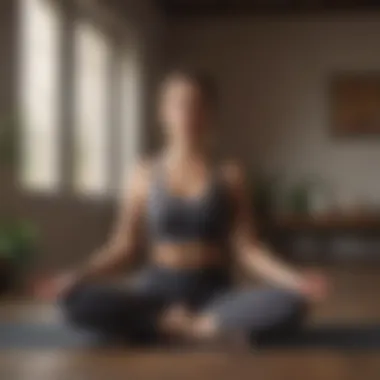Mastering the Art of Relaxation: A Comprehensive Guide to Soothing Your Anxious Mind


Understanding Mindfulnesss
Mindfulness is a practice that involves focusing on the present moment and acknowledging thoughts, feelings, and sensations without judgment. The benefits of mindfulness include reduced stress, improved emotional regulation, and enhanced overall well-being. It plays a crucial role in daily life by promoting self-awareness and a greater sense of control over one's mental state. Cultivating mindfulness involves various techniques such as deep breathing exercises, body scans, and mindful meditation to anchor oneself in the present moment.
Guided Meditation Sessions
Engaging in guided meditation sessions can assist individuals in managing anxiety and promoting relaxation. There are different types of guided meditations available, including body scan meditations, loving-kindness meditations, and mindfulness-based stress reduction practices. Starting a guided meditation practice involves finding a quiet space, focusing on breathing patterns, and following the guided instructions provided by a meditation leader or recording. Enhancing the meditation experience can be achieved by setting intentions, being patient with oneself, and gradually increasing the duration of sessions.
Managing Stress and Anxiety
Stress and anxiety can have profound effects on mental and physical health if not managed effectively. Identifying the causes and understanding the effects of stress and anxiety are crucial steps in developing mindfulness techniques for reducing their impact. Mindfulness practices like deep breathing, progressive muscle relaxation, and visualization exercises can help individuals in alleviating stress and anxiety. Additionally, coping strategies such as maintaining a healthy lifestyle, seeking social support, and practicing self-care can assist in dealing with overwhelming emotions.
Improving Sleep Quality
Quality sleep is essential for overall well-being, influencing cognitive function, emotional regulation, and physical health. Guided meditations designed for better sleep can aid in calming the mind and preparing the body for a restful night. Creating a calming bedtime routine involves turning off electronic devices, dimming the lights, and engaging in relaxing activities like reading or gentle stretches to signal the body that it's time to sleep.
Enhancing Mindfulness at Work
Utilizing mindfulness at work can enhance productivity, focus, and overall job satisfaction. Mindful practices such as mindful breathing, short mindfulness breaks, and practicing gratitude can help individuals navigate work-related stress more effectively. Techniques for managing work-related stress include setting boundaries, prioritizing tasks, and engaging in open communication with colleagues to foster a more positive and mindful work environment.
Understanding Anxiety
An essential aspect of achieving mental peace and holistic well-being is understanding anxiety. In this comprehensive guide on Tranquilyx - Your Ultimate Guide to Mindfulness and Wellness, we delve deep into the intricacies of anxiety, shedding light on its impact and effective relaxation techniques. Understanding anxiety is crucial as it allows individuals to recognize and address their emotional and mental state proactively, fostering a sense of control and self-awareness.
What Is Anxiety?
Definition of Anxiety
Delving into the definition of anxiety provides a fundamental groundwork for comprehending its nuances. Anxiety, in its essence, is a psychological and physiological response characterized by feelings of worry, fear, and unease. It plays a significant role in this article as it forms the basis for initiating discussions on relaxation and mindfulness techniques. Understanding the key characteristics of anxiety, such as heightened stress levels and intrusive thoughts, offers insights into how it manifests in individuals. Exploring the unique feature of anxiety, which is its ability to impact both mental and physical well-being, underscores its relevance in addressing the complexities of human emotions in this article.


Types of Anxiety Disorders
The diverse landscape of anxiety disorders showcases various manifestations of this condition. By delving into different types of anxiety disorders, we uncover the multifaceted nature of anxiety and its effects on individuals. Highlighting key characteristics of specific disorders such as Generalized Anxiety Disorder (GAD) and Panic Disorder broadens our understanding of how anxiety can vary in its presentations. Understanding these disorders is beneficial for this article as it allows us to tailor relaxation techniques to cater to specific anxiety-related challenges. Describing the advantages and disadvantages of addressing different types of anxiety disorders in this article emphasizes the need for a nuanced approach to mental well-being.
Impact of Anxiety on Mental Health
In exploring the impact of anxiety on mental health, we recognize the far-reaching implications of this condition on individual well-being. Understanding how anxiety manifests through symptoms is crucial for early detection and intervention. Symptoms of anxiety, ranging from restlessness to increased heart rate, provide valuable insights into the varied ways anxiety can affect individuals. Discussing the long-term effects of untreated anxiety sheds light on the importance of proactive measures to manage anxiety effectively. By highlighting the adverse consequences of untreated anxiety, such as chronic stress and impaired cognitive function, this article underscores the significance of mental health awareness and resilience.
Practicing Mindfulness
Mindfulness is a powerful technique emphasized in this article as a fundamental practice for relaxation and mental well-being. By delving into the realm of Practicing Mindfulness, individuals can cultivate heightened self-awareness and reduce stress levels. The importance of this topic cannot be overstated, given its profound impact on one's overall mental state. Through mindfulness practices, individuals can learn to focus on the present moment, fostering a sense of tranquility amidst life's chaos. The benefits of Practicing Mindfulness extend beyond mere relaxation, as it contributes to enhanced cognitive functions and emotional regulation. Consumed with the modern-day stresses and anxieties, integrating mindfulness techniques can serve as a transformative tool for navigating through the complexities of everyday life.
Benefits of Mindfulness Meditation
Stress Reduction
Stress Reduction is a pivotal aspect of mindfulness meditation that plays a crucial role in alleviating anxiety and promoting well-being. By engaging in mindfulness meditation, individuals can effectively minimize the physiological and psychological impacts of stress. This practice enables individuals to observe their thoughts and emotions without judgment, leading to a state of calmness and mental clarity. Stress Reduction through mindfulness meditation not only reduces the immediate symptoms of anxiety but also equips individuals with coping mechanisms that foster resilience in the face of adversity. This proactive approach to combating stress makes mindfulness meditation a popular choice for those seeking a holistic solution to anxiety management. The unique feature of Stress Reduction lies in its ability to address the root causes of anxiety, offering sustainable relief and long-term benefits.
Increased Self-Awareness
Increased Self-Awareness, another significant benefit of mindfulness meditation, empowers individuals to develop a deeper understanding of themselves and their inner workings. By practicing self-inquiry and introspection, individuals can unravel ingrained patterns of behavior and thought, leading to personal growth and self-improvement. The glaring significance of Increased Self-Awareness lies in its capacity to enhance emotional intelligence and interpersonal relationships. This aspect of mindfulness meditation nurtures mindful living, encouraging individuals to make conscious choices aligned with their values and goals. The distinctive feature of Increased Self-Awareness is its transformative nature, paving the way for profound self-discovery and positive life changes.
Mindful Breathing Exercises
Techniques to Calm the Mind
Mindful Breathing Exercises offer a repertoire of techniques aimed at pacifying the mind and promoting relaxation. These techniques involve focusing on the breath as a means to anchor oneself in the present moment, transcending turbulent thoughts and emotions. Calming the mind through mindful breathing not only induces a state of tranquility but also regulates the body's physiological responses to stress. By cultivating a deep awareness of the breath, individuals can harmonize their mental state and achieve a sense of inner peace. The advantage of Techniques to Calm the Mind lies in their accessibility and simplicity, making them an ideal choice for individuals of all levels seeking immediate relief from anxiety.
Enhancing Focus and Clarity
Enhancing Focus and Clarity through mindful breathing exercises is instrumental in sharpening cognitive abilities and increasing productivity. By honing the ability to sustain attention on the breath, individuals can bolster their concentration and mental acuity. This heightened focus enables individuals to navigate distractions with ease and engage in tasks with optimal efficiency. The unique feature of Enhancing Focus and Clarity is its transformative effect on one's cognitive functioning, leading to enhanced decision-making skills and problem-solving abilities. Consequently, incorporating mindful breathing exercises into one's routine not only augments mental clarity but also cultivates a sense of mindfulness in daily endeavors.


Implementing Relaxation Techniques
In the realm of mental health and well-being, the section on Implementing Relaxation Techniques holds profound significance. It serves as a cornerstone in the journey towards alleviating anxiety and promoting inner peace. Here, individuals will discover a multitude of strategies aimed at relaxing the mind and body, fostering a sense of tranquility amidst life's uncertainties. By delving into the realm of relaxation techniques, readers are equipped with practical tools to combat stress, anxiety, and tension that often plague modern existence. The importance of this section lies in its ability to empower individuals in taking charge of their mental state and enhancing their overall quality of life.
Progressive Muscle Relaxation
Step-by-Step Guide to Relax Muscles
Exploring the intricacies of the Step-by-Step Guide to Relax Muscles unveils a specialized approach to releasing tension and calming the mind. This methodical process involves consciously tensing and then relaxing individual muscle groups, facilitating a profound sense of relaxation from head to toe. The key characteristic of this technique lies in its systematic nature, allowing individuals to actively engage with their body's response to stress and gradually unwind. The Step-by-Step Guide to Relax Muscles stands out as a popular choice in this article due to its efficacy in promoting deep physical and mental relaxation. Its unique feature lies in the deliberate release of muscular tension, offering a nurturing respite from the demands of daily life.
Reducing Physical Tension
When delving into Reducing Physical Tension, individuals embark on a transformative journey towards releasing the bodily manifestations of anxiety and stress. By focusing on reducing physical tension through various relaxation methods, readers can experience a tangible reduction in stress levels and an accompanying sense of ease. The key characteristic of this aspect centers on targeting physical symptoms of anxiety, such as muscle tightness and discomfort, effectively restoring a state of equilibrium. Within this article, Reducing Physical Tension emerges as a beneficial choice, providing individuals with practical techniques to address the somatic effects of anxiety. Its unique feature lies in the direct correlation between physical relaxation and mental well-being, offering a holistic approach to managing anxiety.
Visualization and Imagery
Creating Mental Images for Relaxation
The practice of Creating Mental Images for Relaxation introduces individuals to the powerful impact of visualization on mental health and tranquility. By conjuring soothing mental images, individuals can transport themselves to a place of serenity and calm, transcending the confines of everyday stressors. The key characteristic of this practice lies in its ability to engage the mind in a positive and revitalizing manner, instilling a sense of peace and balance. Within this article, Creating Mental Images for Relaxation emerges as a popular choice for its efficacy in promoting relaxation and reducing mental distress. Its unique feature lies in the personalized nature of creating mental imagery, allowing individuals to tailor their visualizations to suit their specific needs and preferences.
Easing Anxiety through Visualization
In the quest to ease anxiety through visualization, individuals are guided towards harnessing the potent tool of mental imagery to alleviate psychological distress and worry. By leveraging visualization techniques designed to soothe the mind and mitigate anxious thoughts, readers can cultivate a sense of inner calm and emotional stability. The key characteristic of this approach revolves around using the mind's eye to counteract feelings of anxiety, offering a transformative way to navigate turbulent emotions. This aspect stands out as a beneficial choice in this article due to its ability to address anxiety at its cognitive roots, fostering a sense of empowerment and resilience. Its unique feature lies in the capacity to reframe negative thought patterns through the power of visual storytelling, enabling individuals to rewrite their narrative towards peace and positivity.
Healthy Lifestyle Habits
When delving into the realm of mindfulness and managing anxiety, the role of healthy lifestyle habits cannot be overstated. Adopting routines that prioritize physical well-being can significantly impact mental health. Embracing regular exercise not only boosts physical fitness but also plays a pivotal role in mental wellness. Exercise is a cornerstone for stress management, enhancing mood and reducing anxiety levels. Incorporating movement into daily life goes beyond physical benefits; it infuses our routine with a sense of purpose and vitality. By intertwining movement seamlessly into daily activities, individuals can reap the rewards of a more balanced and centered life.
Exercise for Stress Management


In exploring stress management techniques, physical activity emerges as a potent tool for mental well-being. Exercise acts as a catalyst for releasing endorphins, the body's natural stress-fighters, fostering a sense of wellbeing and resilience against anxiety. The core characteristic of physical activity in this context is its ability to alleviate stress and promote mental clarity. By engaging in physical exercise, individuals can channel their energy positively, leading to a more grounded and calm demeanor. The unique feature of physical activity lies in its versatility, accommodating a wide range of preferences and fitness levels. This inclusivity makes it a popular and effective choice in combatting anxiety, offering a holistic approach to mental wellness.
Incorporating Movement into Daily Routine
The integration of movement into our daily routines complements the benefits of structured exercise. By weaving simple movements into our everyday tasks, such as stretching during breaks or taking the stairs instead of the elevator, we enhance our physical and mental vitality. The key characteristic of incorporating movement into daily routines is its accessibility and adaptability to diverse lifestyles. This flexibility ensures that individuals can cultivate habits that align with their unique needs and schedules. The feature that sets this practice apart is its ability to infuse mindfulness into mundane activities, fostering a sense of presence and intentionality throughout the day. While there may be no inherent disadvantages to incorporating movement, it is crucial to find a balanced approach that suits individual preferences and physical capabilities, enhancing the overall effectiveness of stress management.
Quality Sleep Practices
Adequate sleep is fundamental to mental health and overall well-being. Within the context of this article, focusing on quality sleep practices can significantly impact anxiety levels and promote emotional stability. Exploring sleep hygiene tips unveils a wealth of strategies to optimize sleep quality and maintain a healthy sleep-wake cycle. The key characteristic of sleep hygiene tips is their emphasis on creating a conducive environment for restorative sleep. By adhering to these tips, individuals can establish a bedtime routine that signals the brain for relaxation and promotes deep, uninterrupted sleep. The unique feature of sleep hygiene lies in its ability to address common disruptors of sleep, such as screen time and improper lighting, to facilitate a calm and rejuvenating rest.
Creating a Restful Sleep Environment
Crafting a restful sleep environment is central to enhancing the quality of sleep and managing anxiety levels. By curating a space that promotes relaxation and tranquility, individuals set the stage for restorative rest. The key characteristic of creating a restful sleep environment is its focus on elements that aid in winding down and signaling the body for relaxation. By optimizing factors like bedding comfort, ambient lighting, and noise levels, individuals can create an oasis of calm conducive to deep sleep. The unique feature of a restful sleep environment lies in its ability to set boundaries between wakefulness and rest, nurturing a healthy sleep routine that bolsters mental well-being. While the advantages of such an environment are clear, it is essential to tailor these elements to personal preferences and sensitivities, maximizing the effectiveness of quality sleep practices.
Seeking Professional Support
Seeking professional support is a critical aspect of addressing anxiety effectively. In this section, we delve into the significance of seeking professional guidance when coping with anxiety. Professional interventions offer expert insights and tailored strategies to manage anxiety symptoms comprehensively.
Therapeutic Interventions
Cognitive Behavioral Therapy (CBT)
Cognitive Behavioral Therapy (CBT) is a cornerstone therapeutic approach in managing anxiety. It emphasizes the connection between thoughts, emotions, and behaviors. By identifying and altering negative thought patterns, CBT equips individuals with practical coping skills. The structured nature of CBT makes it a preferred choice for many due to its evidence-based results in alleviating anxiety symptoms.
Mindfulness-Based Stress Reduction (MBSR)
Mindfulness-Based Stress Reduction (MBSR) focuses on mindfulness techniques to reduce stress and anxiety. By cultivating present-moment awareness, MBSR aids individuals in observing their thoughts without judgment. This approach promotes acceptance and enhances emotional resilience. MBSR is favored for its holistic approach, integrating mindfulness into daily activities to foster mental well-being.
Consulting Mental Health Experts
Importance of Professional Guidance
Professional guidance is paramount in navigating the complexities of anxiety. Expert mental health support provides personalized care and evidence-based interventions tailored to individual needs. It ensures a comprehensive treatment plan addressing the root causes of anxiety, leading to long-term recovery and increased well-being.
Accessing Psychiatric Help
Accessing psychiatric help is a crucial step in managing severe anxiety. Psychiatric evaluation allows for accurate diagnosis and medication management when necessary. Psychiatric interventions offer a multidisciplinary approach, combining therapy and pharmacological treatments to address anxiety effectively.







